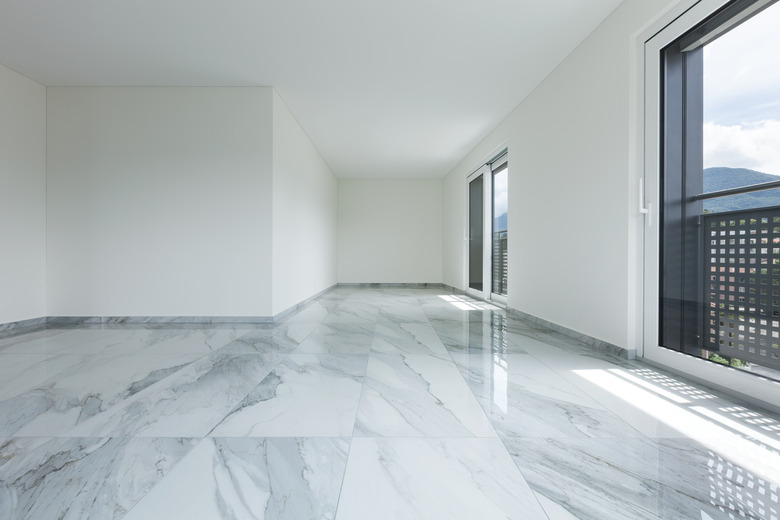The Disadvantages Of Marble Flooring
Stone flooring adds natural beauty to your space while giving it a smooth, clean finish. Marble is a traditional stone-flooring option known for its elegant look. Despite its beauty, marble flooring does come with some potential drawbacks to consider. Comparing the marble tile pros and cons can help you decide if it's the best option for your flooring project.
Marble Flooring Softness
Marble Flooring Softness
Softness and stone flooring don't seem like they should go together, but in the world of stone options, marble is one of the softer materials. That means it's much more susceptible to scratching, chipping, cracking, breaking and scraping from everyday activities. Because of the smooth, polished surface of marble, the material shows that damage very noticeably. If damage does happen, you have to replace the affected tile since there isn't a way to repair the damage.
Vulnerability to Acidity
Vulnerability to Acidity
Anything that's acidic in nature, from tomato sauce to a harsh acidic cleaner, can permanently stain, discolor and etch your marble flooring. That vulnerability to acidic substances makes marble a bad candidate for the kitchen, where orange juice, wine, coffee and other spills can cause serious damage. Wiping up spills immediately can help avoid the damage, but any missed spills or accidental use of an acidic cleaner can ruin the floors.
A Slippery Surface
A Slippery Surface
If you're considering polished marble floors, keep in mind that the material is very slippery, especially when it's wet, increasing the chances of falls. That means it's not the best choice for areas that may get wet, such as bathrooms, kitchens or pool decks. If you do fall on the slippery floor, you may have a higher risk of a serious injury such as a broken bone because it's a hard surface.
Opting for honed marble can minimize the slipping hazard. The texture on this type of marble gives more grip with less slipperiness. Keep in mind that honed marble doesn't have quite the same look as polished marble, so you may have to sacrifice on the aesthetics for less slip.
Potential for Water Damage
Potential for Water Damage
Because marble is porous, it's susceptible to water seeping in and causing damage or discoloration. A penetrating sealer helps keep water from soaking into the flooring. You'll need to reapply the sealer regularly to maintain that level of protection from water.
High Price Tag
High Price Tag
Marble comes in on the high end of stone-flooring prices. Even though you're paying more, it won't necessarily last longer than other stone-floor options. In fact, the softness and susceptibility to damage may cause the floor to have a shorter lifespan. That means it usually doesn't provide the best return on investment.
Consider the Heavy Weight
Consider the Heavy Weight
Another one of the disadvantages of marble in construction projects is the heavy weight. The stone is very heavy, which not only adds a challenge to the installation process, but it can also cause structural issues. Your home's structure needs to be strong enough to support the weight of the heavy floor.
Need for Professional Installation
Need for Professional Installation
Marble flooring is best suited for professional installation because of the difficulty of the process. That's because even a small mistake in the installation can ruin the entire project, which costs you even more money. The softer nature of marble makes it more prone to cracking and other damage during the installation process. Leaving the work to the pros is best, but it does add to the overall cost of the project.
Requires Higher Maintenance
Requires Higher Maintenance
It takes a lot of work to keep marble floors protected and looking good. You'll need to choose your cleaning products carefully to avoid damage from acidic cleaners. Marble also requires annual sealing to keep water and liquids from penetrating the stone. You may also need to polish and regrout the marble tile floor routinely.
